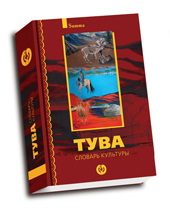|
 Within the framework of the 19th International Moscow Book Fair, which opened in Central Exhibition Centre (pavilion 57), a new book 'Tuva: Dictionary of Culture' was presented to public at large. Within the framework of the 19th International Moscow Book Fair, which opened in Central Exhibition Centre (pavilion 57), a new book 'Tuva: Dictionary of Culture' was presented to public at large.
The idea of making such a dictionary came to Sergei Markus, Moscow journalist, who visited Ustuu-Khuree Festival in Chadan in 2003. He was backed by Academic Project Publishing House which applied for a federal donation to implement it. Tuvan scientists were puzzled at the fact that Markus claimed to fulfill such a large scale project on his own without engaging Tuvan scholars in it. Firstly it was scheduled to be released in 2004 to be distributed at the festivities devoted to the 60th anniversary of Tuva joining the Soviet Union. The dictionary came out two years later.
The book has a good-looking cover, 830 pages of text, and comes complete with a DVD film on Tuva and a CD with Huun-Huur-Tu music, but has a casual approach to the subject and seems to contain inaccurate information.
Sergei Markus seems to rely mostly on the Internet as a source of information (it does offer much on Tuva!) and that is why many articles, mainly biographies, do not have a reference to where they come from. Another clue is that the book speaks of some already deceased contemporaries as still being alive, as there is no note of dates of death. Some picture captions are confusing as well. An example: the famous Tuvan language reseacher, first Tuvan professor Shuluu Sat is illustrated with a photo of another Sat - Oyun-ool Sat, designer of the Tuvan flag.
The choice of personages is also very casual. Much attention is paid to people who have little to do with Tuva. Left out are prominant Tuvan researchers, artists, musicians, actors whom the author happened not to know and did not try to find out anything about. Thus large articles are devoted to Moscow artists Yelena Schepetova and Anna Leon (Sergei's wife) who do have some Tuvan paintings but none is said about great Tuvan artists Vsevolod Tas-ool, Sergei Lanzy, Vladimir Demin, Vladimir Khovalyg, Anna Levertovskaya, Ivan Salchak, etc. Oh, no. Ivan Salchak is present in the dictionary, but his photo is illustrating another Salchak, a story-teller.
Nothing critical could have been said about the book if it had been titled 'My Tuva' or 'What I Know about Tuva' and likewise. In this case Sergei has all the right for his 'creative' approach, some misinterpretations, personal choice of characters to pay attention to, contain factual mistakes. But it is called a Dictionary which means that people would take information from it as something many times proven and right. But it has not been.
|
|
